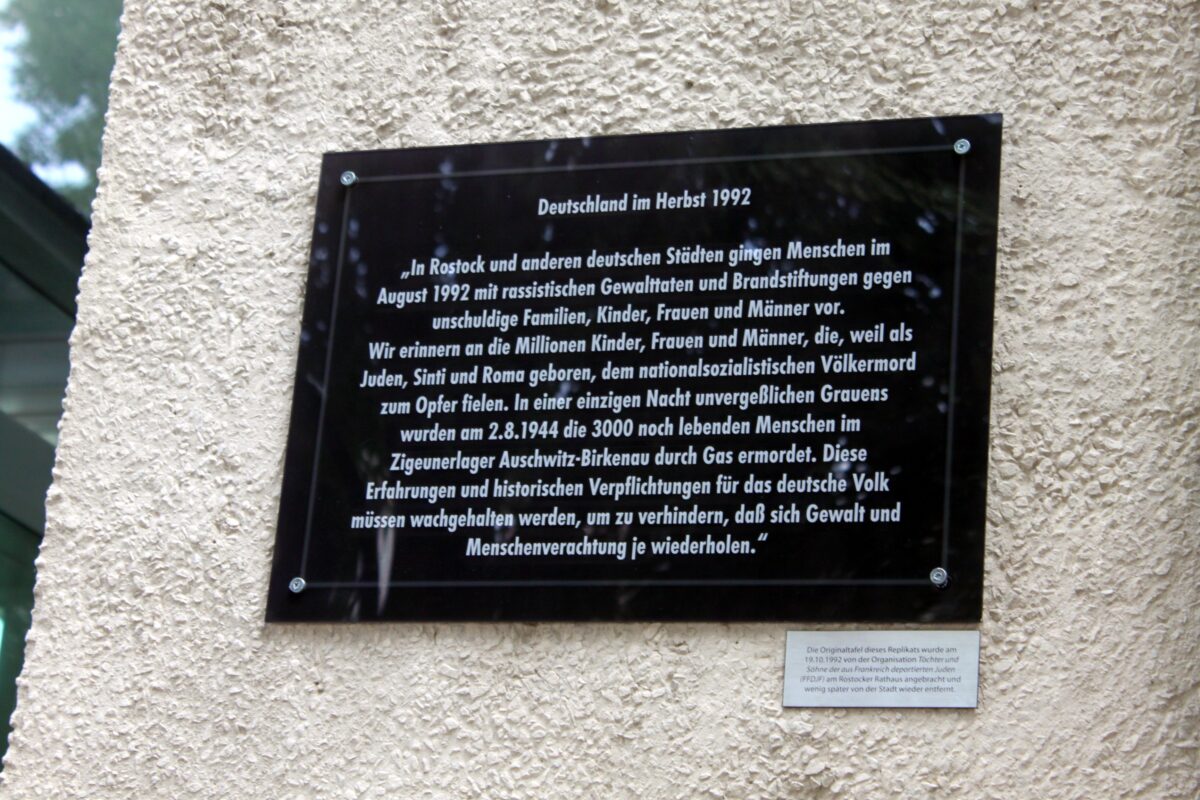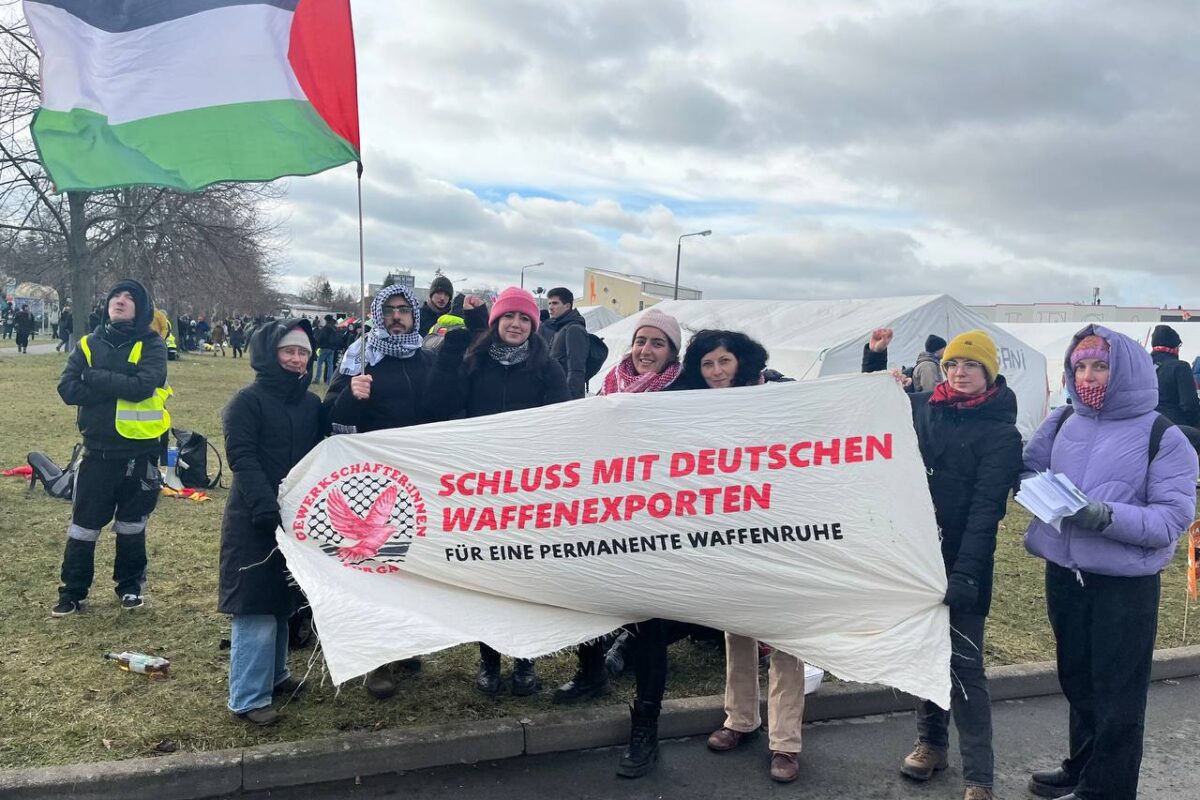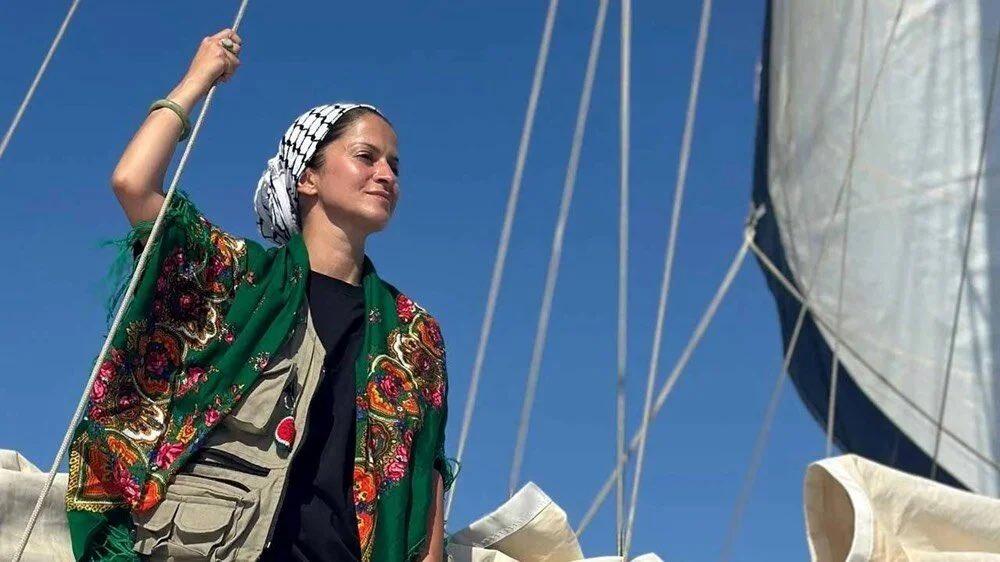Thanks for talking to us, Yasemin. Can you start by briefly introducing yourself?
Thank you for having me. My name is Yasemin Acar. I live in Berlin, and I’m a human rights activist. I’ve been in different movements, different causes, and the center of all my activism is human beings. Humanity doesn’t depend on religion, background, or ethnicity. I really don’t care. It’s about social justice.
I’ve been an active member of the Palestine Solidarity Movement for two years, but I’ve always advocated for Palestine.
You were recently on the Freedom Flotilla which was trying to take aid to Gaza. You were intercepted by the Israeli forces, and didn’t get through. Was it worth it?
In the face of a livestreamed genocide, and decades of occupation and misery by Israel––the Zionist entity––I think anything and everything you do for the liberation of Palestinians is definitely worth it. We have to keep trying to break the illegal blockade. We have to keep trying to stop our governments from supplying the Zionist entity with weapons and money and full support.
This is why we go on demonstrations, knowing very well that the Berlin police could kill someone at any moment. They don’t stop in front of women. They don’t stop in front of children, or the elderly. They simply don’t care. But we still take it to the streets because it’s our duty to keep pushing.
And as you say, this sometimes comes at a personal cost. How were you personally treated by the Israeli troops?
Obviously the treatment wasn’t nice, because they didn’t want us there. Even before they intercepted us, there was a lot of psychological warfare. And when we were finally attacked, they threw a chemical onto the vessel. To this day, we don’t know what it was.
There’s not much humanity to their behaviour towards people in general, but obviously the Zionists are not going to treat us like they’re treating Palestinians. I don’t know if you realize, but we don’t really go into the way we were treated. We wrote reports for the UN about it. We have spoken to our doctors about it, but I refuse to say much to the public.
Our pain is less than the pain of those who are going through the real suffering. We didn’t go there because we have nothing to do. We went because of everything we see through our phones, and everything that we know through history. We have to focus on why we were there, not on how we were treated. We always have to bring back the attention to the suffering, the human rights violations, and the violations of international law.
You’re not just fighting in Israel and Palestine. You were recently in court in Berlin. What were you charged with, and why?
The fight with the Berlin police is with real state violence, basically pure fascism. I’ve been charged with many things, anything they can find. And it’s not just me, they have charged almost everyone. I was taken to court for the slogan “from the river to the sea”, and I was acquitted. They are now going to take it to a higher court because they were not happy with the fact that the judge actually acquitted me.
I think it’s important to dive into why they are doing this. Berlin is supposedly trying to fight against antisemitism. And the more they charge us with these things, the more they can say when the real antisemites come: “Well, we tried to do something against it.” Because they messed up in the 1930s and they did not fight against antisemitism, which led to the Holocaust.
So now they’re trying to change it, but they are targeting the wrong people. And while they’re targeting us and trying to tell us that we are antisemites, they are ignoring what’s really happening with the neo-Nazis in this country, and the rise of the far right. Antisemitism in Germany is not imported.
This is basically to divert attention, and I’m totally aware of it. They’ll use anything to pull you out of demonstrations and to charge you with incitement. They tell you that you’ve done these things, and you know you haven’t, but the police in this country are always right. So no one believes demonstrators when they say: “I have not done this”.
The charges against me are simply ridiculous because they’re based on lies and repression. It’s just a tool for oppression used to silence people. Luckily, the judge in my case did admit that, you know, “from the river to the sea” is not a call for the erasure of Jewish people. It’s a call for the liberation of Palestinians.
I’m sure you’ve seen that the Berlin police recently announced that, although you won your case, and other people have won their cases, they will carry on arresting people for chanting “from the river to the sea”.
Yeah. The police are spreading false information because they say that if you say “from the river to the sea”, you are committing a crime. They say that this is what the prosecutor said, but it is not true. This has to go to a higher judge, and the higher judge has to decide, and this has not happened yet.
What is the importance of Palestine for Germany today?
At this very moment, it’s important because Germany is breaching international law on Palestine. And this is important because Germany claims to be a democratic country. It’s also important because Germany caused the Holocaust and killed millions of people. They then didn’t want these people here.
This is the reason why there was a Holocaust in the first place, because not just Germany but also Europe wanted to push Jews into the Middle East. Germany fully supports the occupation, and maybe it’s because they don’t want the Jews back in Europe. Germany is the root of all evil here.
The biggest Palestinian diaspora in Europe lives in Germany, and their treatment here is not good. For many, many years, they’ve been mistreated here, and in the last two years, it’s gotten worse. I see no difference between what Germany did to the Jews and what they’re doing to Palestinians today. Just because they don’t put them on trains and bring them to camps, doesn’t mean that Germany is not capable of doing that.
There are many, many reasons why Palestine is important for Germany. It’s important on a human level. It’s important on a political level. It’s important on an economic level. But we never get to talk about all of these topics. Unfortunately.
We’ve recently seen a slight change in what the German government is saying. The SPD is now for the recognition of Palestine. Even Friedrich Merz has said that maybe Israel’s gone a little bit too far. Are they being sincere? Is this something we should welcome?
First and foremost, it’s lip service, and not for the first time. Every now and then, when Germany realizes that there’s just too much slaughter going on and we won’t be able to hide it, someone says something. Politicians perform some lip service to calm everyone down. This is a tactic.
They have still sent billions of euros worth of weapons. Just a few days ago—you’re a journalist—the German media dehumanized a journalist who was murdered by the Zionist entity. So if something in politics was really changing, this would be reflected in the media. It would be reflected in the demonstrations. But just two days ago, there was so much police violence.
If what the politicians are saying is true, they would sanction Israel. It’s as simple as that. We should remember these figures because they will go into history books, and I believe that they will have to justify this in some kind of court.
Let’s move from what their side is doing to what our side is doing. This week, Greta Thunberg announced that she’s going to be part of a new and bigger flotilla. What’s your role in the new flotilla?
I’m a steering committee member of the Global Sumud Flotilla. And as soon as I got back to Germany, I started planning this bigger mission. We said we are going to escalate, because that is what’s necessary. By escalating, I mean we have to bring in more boats. We have to bring in more countries. We have to connect with the struggles of the Global South and mobilize worldwide. And this is exactly what we’re doing.
There are 44 countries in this initiative, hundreds of people from across the globe, and we will start sailing from different points of the world and eventually meet in international waters. We will have launch events in Spain, in Italy, and in many other ports. We will leave from Barcelona on 31 August, and we will be joined by dozens of boats leaving from Tunis and other areas on 4 September.
Do you think there’s a chance this time you’ll break through the blockade? Or is it more a symbolic act?
We said we have to escalate with more boats and more people, because, even with the Madleen, we always believed that we would get through.
Yes, the aid that we’re bringing in is not enough. It’s more symbolic to bring the world’s attention to Gaza and the illegal siege, and to show all the illegal things that are happening which breach international law and violate human rights. But the main thing was, always, we will reach Gaza. And if we have more boats, how are they going to stop us? How are they going to stop dozens of boats? They can only stop us if they use the violence that we know they are capable of using.
We want to bring in humanitarian aid. We want to open up a corridor. And we want to tell the world that we all have to come together and challenge the illegal siege, because we can, in fact, break the siege.
If people want to support you, what can they do?
I always say, you don’t need a boat. Your vessel is your body. Even if people cannot be on the boats, they are still very helpful in pressuring their governments. This is what they did when I was imprisoned. There was so much pressure on the German foreign office that they at some point had to shut down their phones.
It’s very important that we continue taking it to the streets. It’s important that we talk about the siege, that we talk about the man-made famine, that we demand an end to this, and that the borders are opened and that humanitarian aid gets in. One of our biggest demands still is sanctions against Israel.
We will have encampments around the world, where everyone will be able to get more information about the mission. We will start mobilizing; we will call for demonstrations, while we are sailing, to show the world that we are all together in this.
We also have a website: https://globalsu mudflotilla.org. On that website, people can apply to be on the boats. You can have dozens of boats, but you have to move them. We are always welcoming more captains and crew. If there are people out there who have experience with boats, if there are captains out there who would like to break the siege with us, please get in touch.
Have you talked to Carola Rackete?
I met her when we were in Malta, when we tried to go with the Conscience, our bigger vessel, and were bombed. She was there to support us. We approached her this time as well. But she’s in the European Parliament, so she has many commitments. She is definitely in support of this flotilla. We are in contact with her.
You talked about encampments. Are encampments going to be planned in Germany?
We will reach out very soon to the world, especially to students, and ask them to come together and create these encampments around the world. Our ground team is going to communicate with all of these encampments worldwide. There will be constant communication between the Global Sumud Flotilla and the encampments.
So watch this space?
Absolutely. Yeah.
While people are waiting to find out about the demonstrations, we’ve got just over two weeks before the flotilla sets off. What can we do to let people know what’s going on?
Watching a livestreamed genocide for two years, we are normalizing a lot of things. We are even normalizing the police violence that we have been experiencing on the streets of Berlin.
We should never normalize these things. We should be outraged, as on the first day. We have to be loud, continue the advocacy, and call for people to not normalize what’s going on, and not to dehumanize Palestinians. Because even in our activism, we sometimes do that, even if we don’t mean to.
We can fall into this trap of dehumanizing Palestinians, and depicting them only by their suffering, just calling them resilient and heroes. We have to look at the fact that Palestinians just want to be. So how can we help the Palestinians just be?
We have to continue the advocacy work. We have to continue to pressure our governments. And honestly, at this point, we need more direct action. We need people to engage in civil disobedience on a large scale, because this is not working.
We’ve been asking for two years, and peaceful protesters are being criminalized by the media, by the state, by the police. This needs to change. We have to push back, and we can’t do that by asking them. We have to tell them that we are the people and that we have a say in this as well, and that we vote the people into power.
It’s not them speaking for us, and it’s not them deciding for us. If we’re not okay that there’s a genocide being committed under our government, then we have to use everything and resist by all means necessary.




